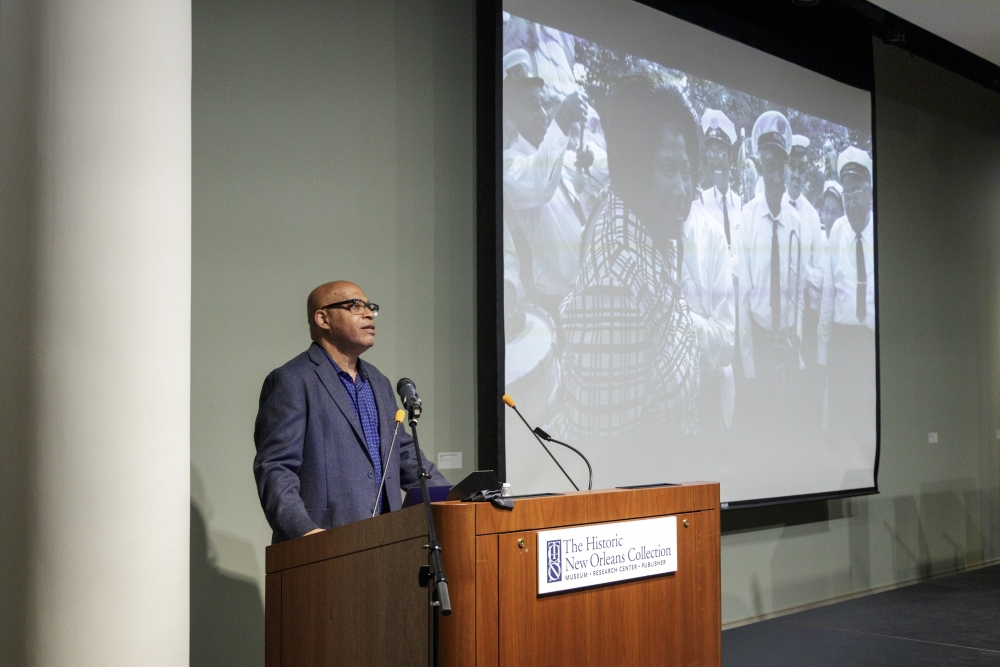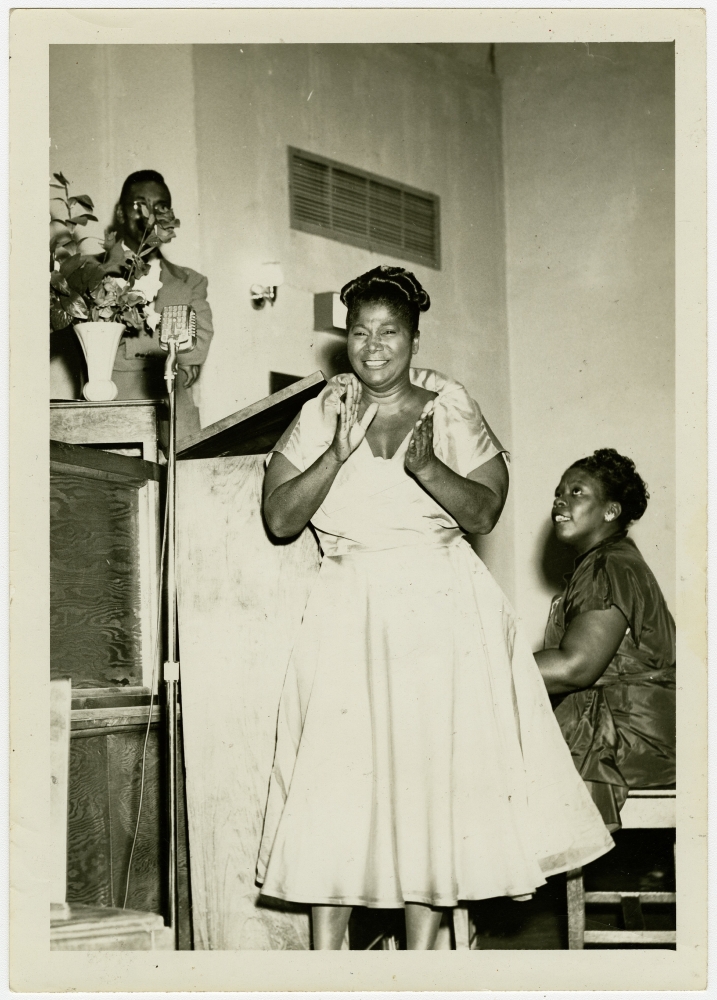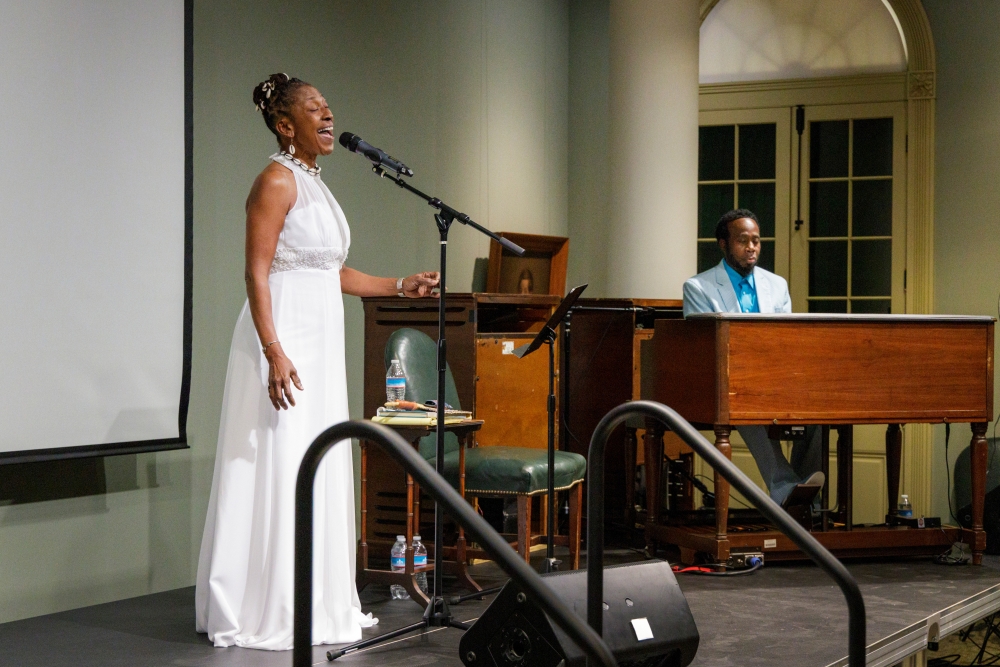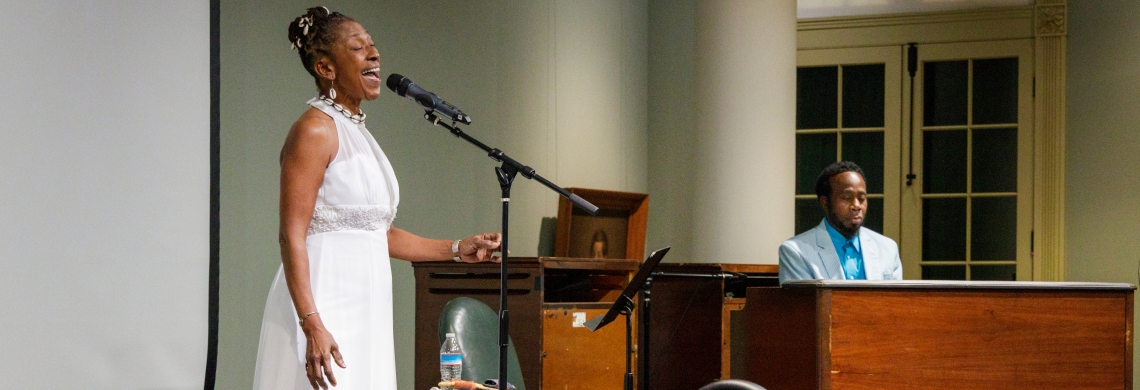It may have been a Wednesday evening, but it felt more like a Sunday morning in the Williams Research Center as vocalist Andaiye Alimayu channeled Mahalia Jackson in her spirited performance of “In the Upper Room.” After accompanist Frederick “Jay” East keyed the final organ notes and the crowd’s applause settled, guest lecturer Dr. Mark Burford proclaimed from the lectern, “We’re starting to have church in here a little bit,” eliciting another round of applause.
The 23rd Bill Russell Lecture, titled “Mahalia Jackson: The Queen of Gospel Music” and held on April 20, featured a scholarly presentation by Burford, the R. P. Wollenberg Professor of Music at Reed College and author of Mahalia Jackson and the Black Gospel Field, interspersed with performances from Jackson’s repertoire by Alimayu and East. Burford noted that for his book he relied extensively on the William Russell Jazz Collection at THNOC’s Williams Research Center; Russell was a confidant and mentor to Jackson, and his collection includes a great volume of Jackson materials. “Working at the WRC transformed the project I was working on,” Burford said in his opening remarks. “I walked in making one book, and walked out making a book on Mahalia Jackson, precisely because the collection was so extraordinary.”

Mark Burford of Reed College delivered a scholarly presentation on the life and career of Mahalia Jackson at the 23rd Bill Russell Lecture. (Photograph by THNOC Assistant Photographer Amber Johnson)
Burford’s lecture traced the arc of Jackson’s life and influence. He observed that there have been no fewer than eight musicals made about Jackson, and that she was the subject of two biopics released just in the last year—Robin Roberts Presents: Mahalia, a Lifetime film starring Danielle Brooks, and Remember Me: The Mahalia Jackson Story, featuring Ledisi in the titular role and streaming on Hulu. “Why do we keep returning to remembering Mahalia Jackson’s life and career?” Burford asked the crowd.
One reason, Burford continued, “is because her family’s story is a quintessentially African American story.” Jackson was the granddaughter of enslaved African Americans from Point Coupee Parish and was born in New Orleans in 1911. She grew up very poor and got her start as a musician singing at neighborhood Baptist churches. As a teenager she followed family to Chicago, where she continued singing at the much larger Greater Salem Baptist Church and ultimately launched her gospel career. “Migration from the rural south to the urban south, from the urban south to the urban north—It’s a story that in some ways makes her a culturally resonant figure,” Burford said.

This photo of Jackson was taken circa 1954, around the time she hosted her own radio and television programs in Chicago. (The William Russell Jazz Collection at The Historic New Orleans Collection, acquisition made possible by the Clarisse Claiborne Grima Fund, 92-48-L.20)
As Burford outlined Jackson’s transition from Decca Records to her major commercial breakthrough with Apollo Records, he ceded the floor for Alimayu and East’s first performance of “I Have a Friend (Above All Others),” which Jackson recorded in her early Apollo years. Alimayu’s evocative vocals alternatingly had the crowd clapping and swaying as if in Sunday service or utterly rapt, such as when she was granted pin-drop silence for an emotional rendering of “Guardian Angels.”
The live music brought an energy that meshed seamlessly with the thoughtful history shared by Burford. At one point, Burford noted the importance of the song “Didn’t It Rain,” which Jackson recorded for Apollo and Columbia, sang during an episode of her Chicago TV show, which aired for one season in 1955, and performed at the Chicagoland Music Festival, which he said “really marked Chicago embracing her and claiming her as a Chicagoan.” He then played audio of Jackson introducing “Didn’t It Rain” at the festival—a live clip that survives only because Russell recorded it from the radio—as a way of setting up Alimayu’s own performance of the song.

Burford’s lecture was interspersed with performances of music from Jackson’s repertoire by vocalist Andaiye Alimayu and accompanist Frederick “Jay” East. (Photograph by THNOC Assistant Photographer Amber Johnson)
“The spirit was so high in the room, it was like Mahalia was sitting right there,” said Dr. Valerie Francis, an award-winning performer and associate professor at Nicholls State University, who trained Alimayu for the performance and was an honored guest at the event.
“Andaiye, her voice is maybe a step lower than Mahalia’s, so we had to transpose a couple things, but she has the sweet nuances in Mahalia Jackson’s voice that come naturally to her,” Francis said later. “She mesmerized the audience.”
It was the first Bill Russell Lecture to be held in person since the start of the pandemic, and Burford closed by acknowledging what that meant to everyone in attendance: “There’s nothing like the magic of being in person and seeing each other and seeing these remarkable musicians.”












